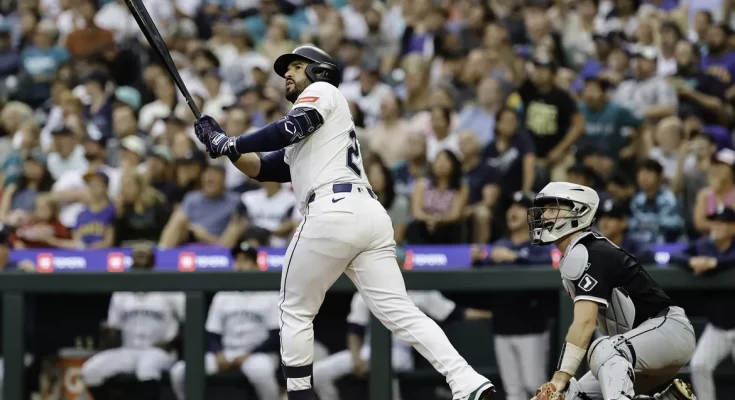Eugenio Suárez has always been a player who thrives on rhythm, confidence, and the joy of the game. His big smile, upbeat personality, and genuine love for baseball have made him a fan favorite throughout his career, and his second stint with the Seattle Mariners is no exception. While his return to the team has come with a few bumps in the road, particularly in the form of a modest hitting slump, Suárez is making it clear that he isn’t losing any sleep over it. In his mind, baseball is a game of ups and downs, and a “little slump” is just part of the natural rhythm of a long season. This level-headed approach, grounded in years of experience, is exactly why teammates and coaches are confident he’ll break out sooner rather than later.
When the Mariners brought Suárez back into the fold, the expectation was that he would provide both a boost to the lineup and an injection of veteran leadership in the clubhouse. Known for his home run power, solid defense at third base, and infectious energy, he was viewed as the kind of player who could help push the team over the edge in their playoff push. But baseball, as Suárez himself will tell you, doesn’t always follow a perfect script. A few weeks into his return, he’s found himself not quite connecting the way he’d like at the plate. His timing is just a tick off, and the balls that used to carry over the wall are finding the outfielder’s glove instead. For some players, this might trigger frustration, overthinking, or even panic. For Suárez, it’s an opportunity to trust the process and lean into what he knows best: staying patient, sticking to his approach, and remembering that production comes in waves.
Slumps are part of every hitter’s journey. Even the best in the game, from legends like Ken Griffey Jr. to modern sluggers like Aaron Judge, have stretches where the hits just don’t fall. What separates a successful hitter from one who gets derailed is how they handle those stretches mentally. Suárez’s perspective is a testament to that. He’s been through these valleys before, and more often than not, they’ve been followed by towering peaks. He knows that one good swing—a line drive into the gap, a well-struck ball over the wall—can flip the switch and turn a slow month into a hot streak in a matter of days. That’s why he refuses to press or alter his entire approach based on a short-term slump. Instead, he’s doubling down on the fundamentals that have carried him through a decade in the majors.
His current batting numbers may not be lighting up the scoreboard, but there are signs beneath the surface that his breakout is coming. His hard-hit rate remains strong, meaning he’s making good contact even if the results aren’t yet there. His swing mechanics haven’t fallen apart; if anything, they’re as compact and balanced as they were during his peak power seasons. Sometimes, slumps have less to do with a hitter’s performance and more to do with timing, matchups, or even just plain bad luck. A perfectly squared-up line drive can still end up as an out if the defense is positioned in the right spot. Suárez understands this, which is why he isn’t about to start reinventing his swing out of frustration.
In the clubhouse, his attitude remains upbeat and encouraging. Younger players look to him as a steadying presence, someone who never lets a bad at-bat carry over into the next one. This is especially important for a Mariners team that’s been battling for position in a crowded playoff race. The pressure is already high enough without players letting slumps dictate their mindset. Suárez leads by example, showing that keeping an even keel is one of the most valuable skills a player can have over the grind of a 162-game season. His experience is a reminder that the game is as mental as it is physical, and that the players who succeed are often the ones who can ride out the lows without losing sight of the bigger picture.
Fans have taken notice of his approach as well. While social media can be quick to judge a player’s slump, there’s an undercurrent of support for Suárez among the Mariners faithful. They remember what he brought to the team before and know that his bat has the potential to change the outcome of any game. When you’ve seen a player hit 30-plus home runs in a season, you know that any quiet stretch is temporary. The home run trot, the big smile rounding the bases, and the energy in the dugout after a clutch hit—it’s all part of the Suárez package, and fans are just waiting for that familiar show to return in full force.
Suárez himself is no stranger to overcoming rough patches. In past seasons, he’s dealt with injuries, mechanical adjustments, and even year-long fluctuations in performance. But each time, he’s found a way to adapt and return to form. That’s part of what makes him so valuable to a team like the Mariners. They’re not just betting on his power numbers; they’re betting on his resilience. They know he can weather a slow month without letting it spiral into something bigger. This composure is the product of thousands of at-bats, countless adjustments, and the kind of baseball wisdom that only comes from living through the grind year after year.
From a broader perspective, his situation also speaks to the nature of the Mariners’ offensive structure. They don’t necessarily need Suárez to be the lone offensive engine. The lineup is deeper than in past years, with contributions coming from multiple spots. This allows him to work through his slump without feeling the weight of carrying the entire offense on his shoulders. When that pressure is removed, it often allows a player to relax and get back to doing what they do best. And when Suárez does heat up, it could serve as the kind of spark that propels the Mariners into a hot streak at exactly the right time in the season.
It’s also worth noting that Suárez’s defense remains a strong asset even when his bat is quiet. He’s making the plays at third base that keep innings alive for pitchers and prevent runs from crossing the plate. That kind of two-way contribution ensures that even during a slump, he’s still impacting games in a positive way. Many players define their value solely by what they do at the plate, but Suárez has long understood that a complete player helps his team win in multiple ways. That mindset has helped him stay positive and productive, even when the offensive numbers temporarily dip.
Looking ahead, the question isn’t if Suárez will break out of this slump—it’s when. His track record suggests that when he does, the results could be explosive. A few home runs in a week, a couple of multi-hit games, and suddenly the narrative shifts from “slump” to “Suárez is on fire.” Baseball history is full of examples of players turning their seasons around in an instant, and Suárez’s combination of skill, confidence, and experience makes him a prime candidate to do just that.
For now, he’s staying focused on the day-to-day grind: putting in the work during batting practice, studying pitchers, and trusting his swing. He’s not chasing hits, he’s not tinkering with his approach every other game, and he’s certainly not letting outside noise affect his preparation. That’s the kind of professional approach that earns respect in any clubhouse. Mariners manager and coaching staff have expressed nothing but confidence in him, publicly reinforcing their belief that he’ll be a key contributor down the stretch.
In the end, Eugenio Suárez’s response to his “little slump” is a masterclass in how to handle adversity in baseball. Rather than dwelling on the negatives, he’s keeping his focus forward, knowing that slumps don’t define a season—responses do. His patience, poise, and belief in his abilities aren’t just helping him personally; they’re sending a message to the rest of the Mariners that the journey is long, and success comes to those who stay the course. When the hits start falling and the home runs start flying, it won’t come as a surprise to him or anyone in that clubhouse. For Suárez, it’s not a question of if—just a matter of time.


